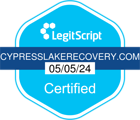Relapse Prevention Skills Program in Texas
In order to live in recovery successfully, relapse prevention skills are the key. Understanding and identifying relapse triggers is crucial in developing effective relapse prevention skills. Our clients begin these relapse prevention skills early on as they learn about themselves and their addiction. The coping mechanisms that you learn in recovery will help you to resist any temptation to use long after your time with us at Cypress Lake Recovery has ended. Addiction recovery is only possible if a person knows how to stay sober and actively engaged in their journey to recovery.
Relapse prevention skills in Texas begin with counseling and dual diagnosis treatment, since knowledge about personal problems and personalities can provide a further understanding of what you need to free ourselves from addictive substances. If a person is using addictive substances to self-medicate, it’s helpful to develop a relapse prevention plan that takes this into account.

Is Addiction Impacting Your Life?
Take The First Step To True Healing Today!
Types of Relapse
Relapsing back into substance abuse can happen in a few ways. It’s not only about using drugs or alcohol after a commitment to stay sober. It’s about recognizing the risk of relapse at every stage and working to maintain recovery even before high risk situations present themselves.
This is the definition of relapse as defined by most people and in most parts of addiction treatment. It refers to the act of resuming drug or alcohol use, whether just once or habitually. It can threaten progress in recovery, but it isn’t fatal to the overall journey of sobriety. It’s important to be wary of high risk situations in early recovery and come up with a relapse prevention plan so it’s not easy to slip into old habits.
Implementing effective relapse prevention strategies, including cravings management techniques, can help individuals navigate high risk situations and maintain their sobriety.
Emotional relapse refers to the phase in recovery where an individual begins to struggle with negative emotions and thoughts, but has not yet returned to harmful behaviors like substance use. During this stage, people may feel stressed, anxious, or overwhelmed, leading them to neglect self-care, triggers, or coping strategies. It’s a warning sign that recovery is at risk if the individual doesn’t engage in health coping mechanisms. Managing emotional relapse involves identifying feelings early, reaching out for support, and returning to healthy coping mechanisms.
Incorporating stress management techniques can be crucial in preventing emotional relapse and maintaining overall well-being.
Mental relapse occurs when someone in recovery begins to fantasize about or justify past behaviors, such as using substances, while still trying to maintain their recovery. This stage involves internal conflict, where the individual may rationalize or plan a return to old habits. It is often triggered by stress, cravings, or unresolved emotional issues. To prevent a full relapse, it’s important to recognize mental relapse early and actively engage in healthier thought patterns and coping strategies.
Effective cravings management techniques can help individuals resist the urge to return to old habits and maintain their recovery.
Contact Our Admissions Team Today
Examples of Coping Skills for Relapse Prevention
Recognizing triggers is essential in this process. Effective trigger management is essential in preventing relapse and maintaining long-term recovery. Everything taught in addiction recovery can be called upon in times of distress. But a key aspect of success is knowing when and how a person is most at risk of using substances (or of wanting to use substances).
Poor self-care can frequently set a person up to make bad decisions regarding their personal health. Working to maintain practices like regular social time, regular bathing, healthy eating, and being open about negative feelings can help build a person’s resilience and help prevent relapse.
To avoid relapse, it helps to remember personal reasons for choosing sobriety. Incorporating mindfulness practices can help individuals stay grounded and focused on their recovery goals. But in high risk situations when an individual is experiencing cravings for drugs or alcohol, it can be hard to think outside the present moment. Deep breathing, naming five things in the room, or listing out what someone is taking in with all five senses can help to ground someone in the present and remember their motivations.
Breaking free of addictive substances can remove the illusion that people are alone in the world. But in times of temptation, it’s easy to forget that many people are happy to help support a person’s journey of recovery. Reaching out to people and expressing vulnerability during times of temptation can help with reminding an individual of their goals.
Even if there aren’t early warning signs that someone may relapse, certain relapse risk factors can increase a person’s likelihood of relapse. A person’s present state can have a huge impact on their willingness to maintain sobriety. Four common situations that can lead to increased likelihood of relapse involve four states of being: Hungry, Angry, Lonely, and Tired. By planning ahead for these situations and developing healthy coping skills, it’s possible to decrease the likelihood of relapse.
Addiction therapy teaches people to be aware of others and their feelings in relation to the way they interact. But it also teaches how to be open-minded and not try to exercise control over every situation. Therapeutic interventions play a crucial role in helping individuals understand and manage their addiction. Support groups can also play a crucial role in this process, helping individuals develop and maintain social skills in recovery. Each can be a lifeline when coping with the initial periods of living sober.

Testimonials
![]()
![]()
![]()
![]()
![]()
Regina
I am so happy that I chose Sabino to begin my recovery. I have suffered for years from depression, anxiety, panic disorder, and PTSD. The programs that are offered here at Sabino have been truly phenomenal in helping me recover. I also appreciated the professional staff that are here on duty 24/7, which helps create a safe environment. Cypress Lake Recovery uses effective “one on one” methods that meet each person’s individual needs because they evaluate and have a better understanding of your personal traumatic experiences. Thanks Sabino, I am truly grateful to you and the Sabino family.
![]()
![]()
![]()
![]()
![]()
J.A.
A beautiful facility! Staff sets the tone and kindness that residents easily follow. Thank you, Cypress Lake Recovery!
![]()
![]()
![]()
![]()
![]()
Pamela
The program at Cypress Lake Recovery works! I emerged from an accumulation of unrecognized emotions, issues of trust, and unresolved grief and loss. 35-days of effective integration of customized quality therapy reconnected my mind, body, spirit, and I am worth it! I had masked emotions and hurtful events for decades with alcohol. At Cypress Lake Recovery I safely focused deep within to unleash harmful secrets and self-degradation. Tools of recovery were practiced, not just presented. Integrative therapies were tailored to my circumstances, thus were effective. This residential program is like no other. For me, Cypress Lake Recovery delivered what was professed. I am forever grateful for this gift of healing.
![]()
![]()
![]()
![]()
![]()
Mike
Life changing experience. Wonderful staff. Wonderful program. Thanks for everything!
![]()
![]()
![]()
![]()
![]()
Darcy
It was great to begin my recovery in a group environment with so many knowledgeable nurses, therapists, BHT’s, and others around for support. The equine therapy, challenge course, family week, and daily therapies all work together seamlessly, allowing me to leave Sabino as a healthier and stronger person!

The Importance of Relapse Prevention Planning
In treatment and in aftercare, it’s incredibly important to reflect on the triggers that may have led to using addictive substances. A person may not know why they’re using substances, but know that they feel poorly whenever they try to stop. Awareness of their “why” can help with avoiding triggers in future or coping in a way that isn’t self-destructive. It opens up possibilities for lasting solutions or coping techniques that don’t also harm the individual.
In treatment and practice, it’s also important to take genuine looks at the impact of addiction on an individual’s life and that of those around them. This part of recovery can be very painful for some people. But avoiding this reflection can lead to ignorance of its impact and prolonged substance abuse that causes further destruction. To prevent relapse and future substance use, it’s important to plan out how it can be avoided.
Don’t Give Up After a Relapse
It’s possible there’s a trigger you may not have planned to encounter. Certain situations may be more difficult or more emotional than you planned, and thus your coping skills need to be adjusted. Using addictive substances may also be a way to deal with symptoms of a condition you aren’t aware of, which requires more research and possibly medical intervention. Extra help and possibly extra research can help set a person up for successful recovery even after a relapse.

Nationally Recognized & Accredited




Heal From Addiction at Cypress Lake Recovery
It’s possible to live a life free from addiction, and it’s possible to receive recovery support all throughout the recovery process. At Cypress Lake Recovery, we help individuals heal from addiction in a tranquil, harmonious setting. In Texas, Our special programs for young adults and first responders help speak to the needs of these special groups.
Don’t live in fear of relapse into substance use. Contact Cypress Lake Recovery today to learn more about how we can help you heal from substance use disorders.



